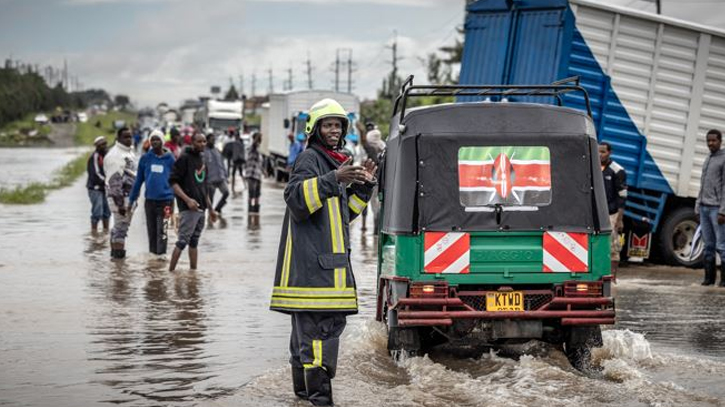
Photo: Collected
The death toll from flood-related incidents in Kenya has crossed 200 since March, the interior ministry said on Friday (3 May), as a cyclone barrelled towards the Tanzanian coast.
Torrential rains have lashed much of East Africa, triggering flooding and landslides that have destroyed crops, swallowed homes, and displaced hundreds of thousands of people.
Some 210 people have died in Kenya "due to severe weather conditions," the interior ministry said in a statement, with 22 killed in the past 24 hours.
More than 165,000 people had been uprooted from their homes, it added and 90 others missing, raising fears that the toll could rise higher.
Kenya and neighbouring Tanzania, where at least 155 people have been killed in flooding, are bracing for cyclone Hidaya, bringing heavy rain, wind and waves to their coasts.
Tanzanian authorities warned Friday that Hidaya had "strengthened to reach the status of a full-fledged cyclone," at 3:00 am local time (0000GMT) when it was some 400 kilometres (248 miles) from the southeastern city of Mtwara.
"Cyclone Hidaya has continued to strengthen further, with wind speeds increasing to about 130 kilometres per hour," they said in a weather bulletin.
Kenya's interior ministry forecast that the cyclone was likely to "bring strong winds and large ocean waves, with heavy rainfall" expected to hit the coast starting Sunday.
The heavier-than-usual rains have also claimed at least 29 lives in Burundi, with 175 people injured, and tens of thousands displaced since September last year, the United Nations said.
The rains have been amplified by the El Nino weather pattern -- a naturally occurring climate phenomenon typically associated with increased heat worldwide, leading to drought in some parts of the world and heavy downpours elsewhere.
Late last year, more than 300 people died in rains and floods in Kenya, Somalia and Ethiopia, just as the region was trying to recover from its worst drought in four decades.
Cyclone season in the southwest of the Indian Ocean normally lasts from November to April and sees around a dozen storms each year.
Messenger/Sumon








